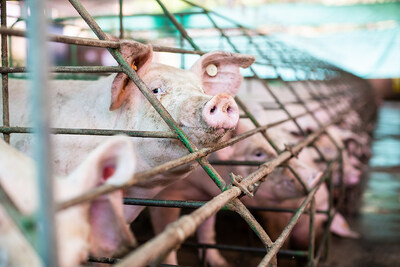Subjects: SVY, AVO, ANW
STRONGER ANIMAL WELFARE PROVISIONS KEY TO LOWERING THE USE OF ANTIMICROBIALS IN ANIMAL AGRICULTURE
Rather than continued reliance on prophylactic antimicrobial use that drives up costs for humans and growing risk of 'superbugs', changes to how farm animals are kept can improve food safety and lower antimicrobial use.
TORONTO, Sept. 19, 2023 /CNW/ - A new report from World Animal Protection Canada illustrates the dangers of continued inaction on the overuse of antimicrobials in animal agriculture and the solutions for government and industry.
Reducing antibiotic use in farming through improvements to animal welfare outlines why the overuse of antimicrobials in animal agriculture is dangerous, and how stronger animal welfare provisions across animal agriculture industries, is key to lowering the use of antimicrobials in Canada.
"The reality is if Canada implemented stronger animal welfare policies and infection control provisions in animal agriculture, antimicrobial use could be significantly lessened or even eliminated," said Lynn Kavanagh, World Animal Protection Canada's Farming Campaign Manager. "75% of antibiotics are used in farming. This is contributing to global antimicrobial resistance and further inaction will lead to a growing cost for us all."
In Canada, the majority of antimicrobial use in farmed animals is to prevent disease rather than treatment. In 2019, Quebec led by banning the preventative use of Category 1 antibiotics (considered the highest importance for human health) on farms, limiting to only disease treatment that is present or suspected.
No other provincial government has taken such action since, and, while Canada launched its Pan-Canadian Action Plan on Antimicrobial Resistance this year, it still lags behind jurisdictions including the European Union and the United Kingdom.
The overuse of antimicrobials is a main driver in the development and spread of antibiotic resistant "superbugs". Canada lags behind the rest of the world in regulating antimicrobial use. In 2022, the European Union banned prophylactic use of antimicrobials in animal agriculture.
The report calls for the federal government to follow the leads of the European Union, United Kingdom and Quebec and start by implementing several key policies and legislative changes including:
- Forbidding Category 1 antimicrobials for preventative purposes in food animals and only use when there is a curative need, and if no lower category treatment option is available
- Better data tracking for antimicrobial sales and use in animal agriculture
- Requiring more humane farming methods and improved animal welfare practices to reduce antimicrobial use, particularly through decreased stocking density, extended weaning times, environmental enrichment and improved ventilation
With no action from the federal government, antimicrobial resistance (AMR) will grow. It's estimated if AMR increases from 26% to 40% by 2050, the cumulative cost to Canada is estimated to be:
- 396,000 human deaths from antimicrobial resistance
- $120B in hospital costs
- $388B in GDP loss
Source: Adapted from When Antibiotics Fail. The Expert Panel on the Socio-Economic Impacts of Antimicrobial Resistance in Canada (2019)
"There are global examples of how improvements in the treatment of farm animals can dramatically reduce our overreliance on antimicrobials," added Kavanagh. "Moving to sustainable farming will make our food supply safer and improve public health."
For decades, World Animal Protection Canada has been researching and working with policy experts to create an environment where respect for animals and nature sit at the heart of our food system, which is equitable, sustainable, resilient and capable of feeding the world.
Notes to Editor:
The Executive Summary and the Full Report are available to download and share at worldanimalprotection.ca
SOURCE World Animal Protection
These press releases may also interest you
|
News published on and distributed by:




